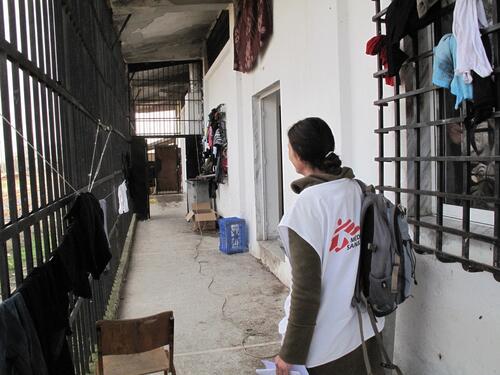Tychero border police station, Evros, Greece - December 2010 MSF's emergency coordinator visits one of the cells in the border police station of Tychero in the region of Evros. MSF has started an emergency intervention in Evros for the provision of medical and humanitarian assistance to migrants and asylum seekers detained in appalling living and hygiene conditions in detention facilities.
Athens —Migrants and asylum seekers kept in detention facilities in the Evros region of northern Greece are in a critical situation. During the last two months the number of migrants without official papers crossing the border from Turkey to Greece has increased significantly, with 200 to 300 new arrivals each day.
As a result of the recent influx, detention facilities are overcrowded, while conditions in the cells are appalling. To respond to the urgent needs of detained migrants, Médecins Sans Frontières (MSF) has started an emergency intervention in the Evros region, providing medical and humanitarian assistance.
During an assessment carried out in November in two detention centers (Venna, Fylakio) and three border police stations (Soufli, Tychero and Feres), MSF documented the harsh and inhumane conditions in which detained migrants are being kept. Most of the detention facilities are very overcrowded, operating at two or three times their capacity. Due to the lack of space, men, women, young children and unaccompanied minors are being kept together in the same cells. People have to sleep on the floor next to the toilets.
Detention facilities holding more than 100 people typically have only two toilets and two showers, and there is a significant lack of materials for cleaning and personal hygiene. Despite the presence of Ministry of Health medical staff in most of the detention facilities (including doctors, nurses and one psychologist), medical services are still inadequate for the detainees’ needs due to the insufficient number of medical personnel, the absence of interpreter services, and the lack of medical screening and follow up of new arrivals. In addition, migrants and asylum seekers receive little or no information about their legal status and the detention system.
“The situation is critical for all the people who have been detained. Migrants have no place to sleep, they are not allowed to go out into the yard, and many of them are obliged to live for weeks or even months in unacceptable living conditions,” said Ioanna Pertsinidou, MSF’s emergency coordinator. “We decided to intervene immediately for the provision of medical care and humanitarian assistance.”
Since the beginning of December, an MSF team has been in the Evros region providing healthcare and working to improve living and hygiene conditions in the detention facilities. Two MSF doctors are working in Tychero and Soufli border police stations treating patients who are mostly suffering from respiratory and skin infections due to the harsh living conditions. A logistician is working to improve sanitation inside the facilities and the MSF team is also distributing sleeping bags.
“What we witness every day inside the detention facilities is not easy to describe,” said Pertsinidou. “In Soufli police station, which has space for 80 people, there are days when more than 140 migrants are detained there. In Tychero, with a capacity of 45, we counted 130 people. In Feres, with a capacity of 35, last night we distributed sleeping bags to 115 detained migrants. One woman, who had a serious gynaecological problem, told us that there was no space to sleep and she had no other option but to sleep in the toilets. In the detention centre of Fylakio, a few days ago several cells were flooded with sewage from broken toilets. MSF has ensured the disinfection of the cells and the toilets. In Soufli, where winters are known to be harsh, with below-zero temperatures, the heating is not working and there is no hot water. In many detention facilities, we saw many unaccompanied minors detained in the same cells as adults for many days without being allowed out in the yard.”
An immediate and coordinated response is needed to respond to the current unacceptable situation and to ensure humane and dignified conditions for detained migrants. MSF urges the Greek government to immediately implement measures providing for the reception of asylum seekers and migrants under conditions which respect their human dignity.
MSF also urges the EU and its member states to share the responsibility of receiving asylum seekers and migrants, rather than focusing on restrictive measures, such as the deployment of FRONTEX rapid border intervention teams.



